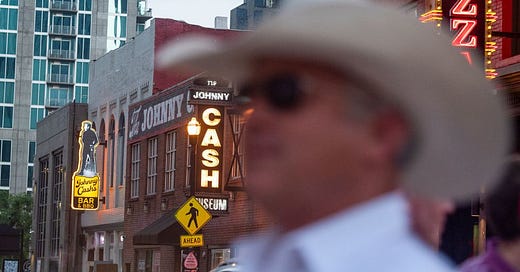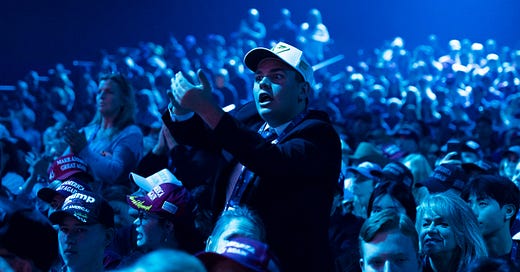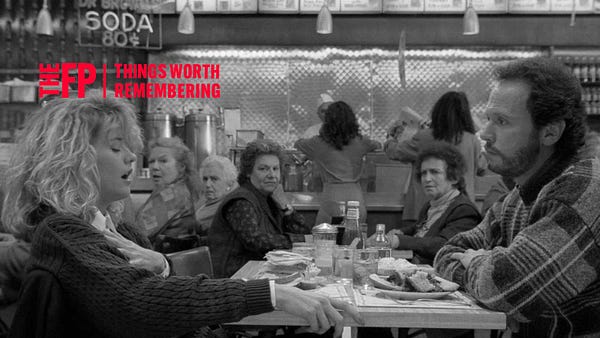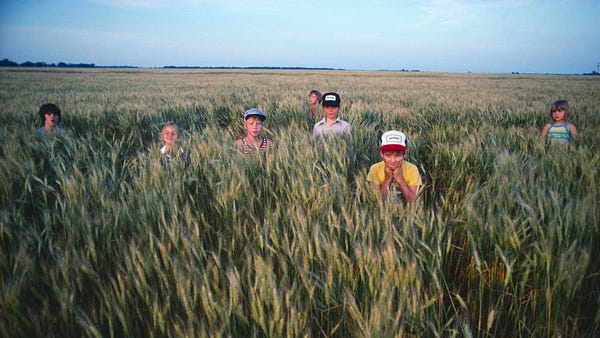
The Free Press

It’s Sunday night in Nashville, and my father and I wade into a sea of cowboy hats. Most of the 4,000 seats are filled—the women in denim cutoffs with matching hats and boots; the men in faded flannels. Almost everyone is sipping hard seltzer or whiskey out of Dixie cups.
Center stage, Dylan Marlowe from Georgia is strumming his six-string and crooning: In a world that’s changing, I sure as hell ain’t, son. The host, with his porkpie hat and salt-and-pepper soul patch, stands to the side. They’re enveloped by the red glow of the lights behind them and the sign, front and center, staring down at the raucous crowd: GRAND OLE OPRY.
This is where Johnny Cash once played. And Elvis. And Garth Brooks. This is where Vince Gill and Patty Loveless performed their emotional 2013 rendition of “Go Rest High on That Mountain.” This is where Merle Haggard, in his final 2015 Opry appearance, did “I Think I’ll Just Stay Here and Drink.”
This is where the gods of country make their name. This is Mecca, and tonight we’re making the pilgrimage.
As we take our seats, Marlowe wraps up his set, and William Lee Golden and the Goldens stride onto the stage.
With his white beard trailing down to his belt buckle, the frontman takes his place in the famous Opry Circle. The circle has a diameter of six feet, and it’s made of maple and white oak. It is a holy place in a holy place. This is where greatness happens.
As the opening notes of “You Are My Sunshine” pour from the stage across the audience, my dad and I glance at each other.
“Do you remember your mom singing this to you before bed?” he whispers.
“Of course,” I say.
The thing is, I’m not supposed to like country music. Country is the South, and the South is slavery and burning crosses and church bombings. Morgan Wallen, the reigning king of country, recently went viral for saying the n-word. And by the way, I’m black, and country music is white.
But country music isn’t truly white, because nothing in America is entirely white or black or anything else, and nothing that endures—nothing with value—is about race at all. It goes beyond that.
Sure, country is the music of trucks and whiskey and your hometown, which is usually, but not always, in a state that was once in the Confederacy. At first blush, it sounds a lot like white folk music.
But suppose you switch the Ford flatbed for a drop-top Lambo, the whiskey for Patron, and “Sweet Home Alabama” to “Straight Outta Compton”: magically, it begins to sound a little blacker. Or the sound: the heart of country is the banjo, the first iteration of which was a gourd with animal skins attached to wooden necks—imported from West and Central Africa in the seventeenth and eighteenth centuries during the transatlantic slave trade. Or the structure of that sound: country revolves around a three-chord progression not that dissimilar to the 12-bar blues, which is built around the first, fourth, and fifth notes of a scale.
And let’s not forget some of the country stars themselves: Charley Pride, a black man born on a sharecropping farm in Sledge, Mississippi, is a three-time Grammy winner and number 18 on CMT’s “40 Greatest Men in Country Music,” and Darius Rucker, a black man from Charleston, South Carolina, holds one of the top five best-selling country records of all time.
To insist on viewing country, or any other art form, through a racial lens is to obscure its history and to miss the beauty in that art form. It is to sap the art of its art.
My trip to the Opry began 14 hours earlier, very early in the morning, when my father and I left our apartment in lower Manhattan and headed down South.
As a kid, the city was all I ever knew.
Same for my father, who grew up on the South Side of Chicago. “Down South” was where his classmates went to visit family. It was rural and backward and mysterious. It was where Arthur Green, the manager at the bottling factory where my Dad worked as a teenager, came from—the place where Green lost his two front teeth and his two middle fingers in a wood-chopping accident that supposedly ended with his fingers jumping off the chopping block where some chickens ate them.
This is the South I pictured awaiting our arrival as the skyscrapers disappeared into plastic white crosses tucked between American flags and pine trees. Despite our ancestors upending their lives to flee the South, here were my father and I speeding toward it.
That afternoon, we crossed the state line separating Virginia and Tennessee, and pulled into a Love’s gas station to get a snack. I was in my Brown University sweats and a hoodie, clean-shaven, with a Nikon camera around my neck, and it seemed like everyone else in the mini-mart attached to the gas station was wearing a thick beard and an Under Armour Freedom t-shirt. Next door to the Love’s was a Quality Suites; on the other side was the perfectly groomed football field of a Catholic school. In the parking lot outside the mini-mart, I saw a sheriff pressing two men’s heads into the side of his squad car, and I tried to hurry out the door, but my dad stopped me.
“What are you doing?” I asked.
“Buying a lottery ticket,” he said. “Everyone who wins the lottery gets their ticket from a Piggly Wiggly down South.”
A few hours later, the Nashville skyline came into view. We were staying in a ritzy part of town, the Gulch. It was teeming with new apartment complexes and hipsters in athleisure, and as we made our way to our hotel, my dad remarked that it looked just like Williamsburg in Brooklyn.
There were superficial traces of the Old South: Rosa Parks Drive, John Lewis Way. (The next day, we went looking for what we thought was an old plantation, Belle Meade, but it turned out to be a gated community.)
My mother had always forbidden me from going down South. The racism, the violence, the not-so-distant past. So I stayed in the universe I came from: I went to Saint Ann’s (Lena Dunham’s alma mater) and to Brown University. I took classes like “Writing the Revolution.”
But then, one day last year, I heard Morgan Wallen’s “Sand in My Boots” and fell in love with country music. “Sand in My Boots” is lyrical and mournful—it’s a story about hope and promise in the land of “sunburnt Silverados” and “heart-broke Desperados,” and potholes and dogwood trees.
Around the same time, I started my nonfiction writing seminar, which started with a quote from the literature scholar Stanley Fish: “Some appreciate fine art; others appreciate fine wines. I appreciate fine sentences.” And that started me down the road of thinking more seriously about words, sentences, language, and the meanings behind them.
The more I listened to country—its lyrics and its poetry—the more I realized how much it applied to people like me. Country music, after all, is the music of the forgotten. Think of Luke Combs singing So just remember when you’re drivin’ through nowhere / To us, that’s the middle of somewhere.
Yes, I know: I’m from Tribeca. I attended a tony private school in the cradle of American power and prestige, and I’m a junior at an Ivy League university. I’m hardly “forgotten.” But in a summer when country music dominated the charts, a lot of people clearly felt like me. Morgan Wallen’s “Last Night” spent 16 weeks at number one on the Billboard Hot 100. In the last week of July, the top three slots on that list were dominated by Jason Aldean, Wallen, and Combs. In August, upstart Oliver Anthony, with his “Rich Men North of Richmond,” became the most talked about music sensation on YouTube. On Thursday, NBC broadcast the first-ever People’s Choice Country Awards, live from the Grand Ole Opry, due to popular demand.
How could the music of so many also be the music of those left behind by everyone else?
The point is country is the music of those we don’t always see, those who don’t fit squarely into the categories of mainstream, contemporary America.
It was only in Tennessee, the land where Martin Luther King Jr. was murdered, that I began to see the rigidity of those categories—and, more importantly, to imagine those categories falling away into something richer and more powerful. It was only there that I could begin to integrate all the apparent contradictions of music and race and history and culture.
Including the contradiction that is my mother.
When my mother drinks one too many glasses of rosé and lets herself travel back through memories buried below the Mason-Dixon line, she inevitably returns to her childhood in Texas. Backyard baby back ribs in a homemade vinegar sauce cooked by an auntie or cousin down the road. A block full of friends. A potbellied uncle. It is a wonderful place cocooned by a much more dangerous place shot through with lynchings and segregationists and people who pine for the old Dixie. It seems incongruous.
The South, maybe more than anywhere else in America, is where the old black and white cultures and heritages overlap, intertwine, become something transcendent. This is what I felt while enveloped by the sounds of William Lee Golden singing a song my mother once sang to me. This is where I finally grasped the ethos of country as explained by the great jazz trumpeter Wynton Marsalis—that even in the face of deep suffering, “optimism is not naive.”
One month after returning from Nashville, I found myself at a Luke Combs concert in Philadelphia seated next to a woman with a Blue Lives Matter tattoo.
That night, Combs was singing his cover of Tracy Chapman’s “Fast Car.” Over the summer, the song had risen to number two on the Billboard Hot 100, which had upset a lot of people on the site previously called Twitter, since a white, straight man (with a beard! from North Carolina!) was apparently appropriating or exploiting a gay black woman’s song.
In the arena, surrounded by 60,000 fans, there was no controversy. No manufactured anger. No one accusing anyone of usurping someone else’s lived experience. All I could feel was the warm sense of connection that makes this song so rich. It turns out that the desire to live outside other people’s boundaries was not just a Southern thing.
In Philadelphia that night, it seemed like the whole world was a Luke Combs fan.
Even as his accent tells you that his is a different story than Chapman’s, the words remind you that it’s the same. The car he and Chapman sing of is equal parts sweet chariot and Ford F-150. They are both racing to the same place, and that place is freedom and self-realization, both beautiful and uncontainable.
Evan Gardner is an intern at the Free Press. You can check out his previous story “Taylor Swift Unites America” here, and you can find him on X, formerly Twitter @EvanGardne9.
Become a Free Press subscriber today:

















I can’t add to the existing commendations. They delineated everything i was going to say. I will commiserate with your discovery of the South. In 1970, with a BA in political science, I moved to southwest Georgia, near Pavo and Moultrie, and spent an idyllic decade living in an old tenant house, growing vegetables, raising chickens, keeping bees and getting to milk a Nubian goat.
All my stereotypes were destroyed, and that lesson has stayed with me throughout my life.
If you like country music, you should listen to two ‘70’s Grateful Dead albums, American Beauty and Workingman’s Dead. It was the debut of the Dead switching from their ‘60’s content to their rendition of joy, despair and classic Americana.
Thank you!